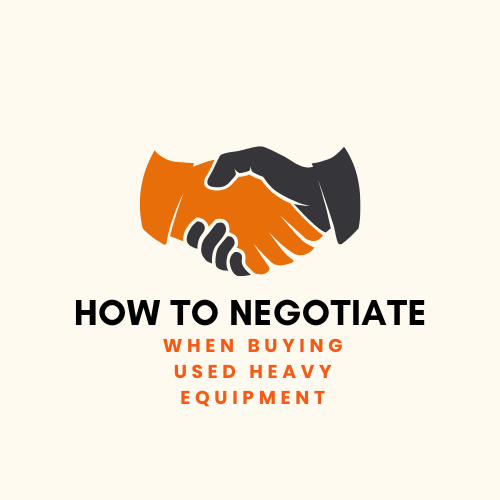Heavy Equipment Interesting Articles at HeavyEquipment.com
The Dirt Desk - Q&A
How to Negotiate When Buying Used Heavy Equipment
Get the Best Deal Without Getting Burned
Buying used heavy equipment can be a smart way to save money, expand your fleet, or replace an aging machine without breaking the bank—but only if you know how to negotiate effectively. Whether you’re buying from a dealership, auction, or private seller, smart negotiating can mean the difference between a great deal and a costly mistake.
Here’s how to approach negotiations with confidence, make informed decisions, and walk away with the best value.
Do Your Homework First
Before you even start talking numbers, research the market. Know what similar equipment is selling for in your region, online, and at auctions. Pay attention to:
- Make, model, and year
- Condition and number of hours
- Attachments included
- Service and maintenance history
- Transport and inspection costs
Use platforms like HeavyEquipment.com, auction listings, or equipment resale sites to benchmark pricing. Knowledge is power—and it gives you leverage.
Inspect Before You Negotiate
Never negotiate blindly. Whether in person or with the help of a trusted mechanic, inspect the machine closely:
- Look for visible wear and tear (cracks, rust, leaks)
- Check tires or tracks, hydraulic lines, and undercarriage
- Start the engine—listen for odd noises, smoke, or slow start
- Test major functions (swing, boom, tilt, steering, brakes)
- Review maintenance records and any repair history
Tip: If buying sight unseen, request detailed photos/videos or hire a third-party inspector.
Ask Questions Like a Pro
Sellers expect questions—so ask the right ones:
- Why are you selling?
- How long have you owned it?
- Any recent repairs or parts replaced?
- Any issues not visible?
- Has it been used in harsh conditions (e.g., demolition, salt-heavy regions)?
Asking good questions can reveal red flags and give you talking points for the negotiation.
Don’t Show All Your Cards
Keep your excitement in check. If a seller knows you're desperate or emotionally invested, they may be less flexible. Instead, stay neutral and professional:
- “It’s in decent shape, but I’ve seen others with lower hours.”
- “I like the machine, but the undercarriage will need some work soon.”
- “I’m looking at a couple similar units—depends on the price.”
You're showing interest without giving away your position.
Use Facts to Support Your Offer
When it’s time to make an offer, back it up with solid reasoning:
“Based on the condition, hour meter, and the fact that it needs new tracks soon, I’d be comfortable offering $58,000 instead of the $65,000 asking.”
Being specific builds credibility and often gets better results than vague haggling like, “Can you do better?”
Negotiate More Than Just Price
Sometimes a seller won’t budge on the price—but there are other things you can negotiate:
- Include attachments (buckets, forks, breakers)
- Free or discounted delivery
- Fresh service or inspection before sale
- Extra filters or spare parts
- A short-term warranty or guarantee
Get creative—extras can add real value.
Be Ready to Walk Away
If the deal doesn’t make sense—walk away. Let the seller know you’re serious but not desperate:
“I appreciate your time. If things change, here’s my number.”
Sometimes walking away brings the seller back to the table with a better offer. If not, you’ve avoided overpaying for a machine that wasn’t right.
Seal the Deal in Writing
Once you reach an agreement, get everything in writing:
- Final price and payment terms
- Description of the equipment (make, model, serial #, hours)
- List of any included attachments or extras
- Delivery or pickup arrangements
- A signed bill of sale
This protects both parties and avoids misunderstandings later.
Negotiating for used heavy equipment isn’t about being pushy—it’s about being informed, respectful, and strategic. With the right approach, you can get the machine you need without overpaying or inheriting someone else’s problem.

